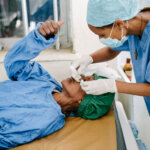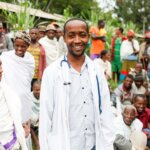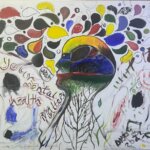- Disability Rights
Light for the World and several disability experts applaud the World Health Organisation’s new report demanding equal access to health services for people with disabilities.
Health is a human right. Like everyone else, people with disabilities have a right to the highest attainable standard of health, and to get equal access to health care without discrimination, barriers or extra costs. All governments have a duty to protect and fulfil this right.
This is the unapologetic principle of the World Health Organisation’s (WHO’s) key research and strategic guidance on disability inclusion: the Global Report on Health Equity for Persons with Disabilities. This report radically shifts its focus to the rights of people with disabilities thanks to years of lobbying by allied disability organisations and Light for the World.
Health matters
We all need to be healthy to be able to get the most out of going to school, work or being out in the community. This is true for people with disabilities as much as it is for anyone else in society.
Yet people with disabilities are unable to participate fully in these essentials because too often, they’re blocked from getting the care they need. Take young people with vision loss, for example. 90 million children and adolescents worldwide have impaired sight. Because of a lack of resources blind children in low- and middle-income countries often cannot go to school, which then means they may struggle to earn a living in later life. This is even more tragic knowing that most vision loss is preventable.
At Light for the World, we’ve seen many challenges first hand while working to improve eye health services in Africa. These barriers include discriminatory attitudes and poor understanding among health staff, a lack of eye specialists, a lack of assistive technology, reasonable accommodation to access health information, and high treatment costs.
“Light for the World is incredibly happy that this report sees the light of day. It is a crucial resource that was long overdue and that will positively shape health policy for years to come”, explains Elie Bagbila, Head of Rights & Advocacy. “Our regional and thematic expertise was sought after, during the making of the report, and we joined forces with our allies to ensure that it places the rights of persons with disabilities front and centre.”
Affordable and inclusive care
Among the many recommendations in the new WHO report is for governments to provide affordable health services. We’re already working with governments in Burkina Faso, Ethiopia and Uganda to strengthen eye care services and offer free cataract surgeries, eyeglasses, medication and other treatments where needed.
“It’s heartening that the WHO report validates the importance of disability inclusion in health care services, and we’re always looking for ways to improve”, adds Marieke Boersma, Head of Quality & Innovation. Light for the World has already worked on tools to enhance the accessibility of health information for people who are blind or have low vision. “This report shows that this is not a “nice to have” but a right of all people with a disability.”
But Light for the World cannot do this alone. Governments must do their part and ensure that people with disabilities have equal access to health services. This is something that is still too often ignored and needs to change.
“We will continue working with our partners in government and in civil society to ensure that the recommendations of the report are realised”, concludes Elie Bagbila. “And our efforts need to go beyond the recommendations of this report. We need to look at the wider topic of disability inclusion across the full continuum of health care, regardless of the specific health sector. Removing health inequities for persons with disabilities is a duty for all, not a choice.”
Title image © Gregor Kuntscher





